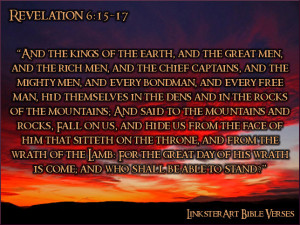The seven signs of the apocalypse, as elaborated upon in the Book of Revelations in the Bible, includes the arrival of the Antichrist, war, famine, plague, judgment, chaos, and silence or rebirth. The first four symbols are generally depicted by the symbol of the four horsemen of the apocalypse, which represent the opening stages of the apocalypse.
(2 Kings 18:26; Ezra 4:7; Daniel 2:4), more correctly rendered 'Aramaic,' including both the Syriac and the Chaldee languages. In the New Testament there are several Syriac words, such as 'Eloi, Eloi, lama sabachthani?' (Mark 15:34; Matthew 27:46 gives the Heb. form, 'Eli, Eli'), 'Raca' (Matthew 5:22), 'Ephphatha' (Mark 7:34), 'Maran-atha' (1 Corinthians 16:22).
The Syriac Apocalypse Of Ezrarejected Scriptures In The Bible
A Syriac version of the Old Testament, containing all the canonical books, along with some apocryphal books (called the Peshitto, i.e., simple translation, and not a paraphrase), was made early in the second century, and is therefore the first Christian translation of the Old Testament. It was made directly from the original, and not from the LXX. Version. The New Testament was also translated from Greek into Syriac about the same time. It is noticeable that this version does not contain the Second and Third Epistles of John, 2 Peter, Jude, and the Apocalypse. These were, however, translated subsequently and placed in the version. (See VERSION.)

The Syriac Apocalypse Of Ezrarejected Scriptures Verse
- Apocalypse of Peter DEAD SEA SCROLLS The Dead Sea Scrolls are a collection of some 981 different texts discovered between 1946 and 1956 in eleven caves in the immediate vicinity of the ancient settlement at Khirbet Qumran in Israel.
- Brown writes of chs. 3-14: 'This is the Apocalypse of Ezra, sometimes called 4 Ezra. By far the most important part of 2 Esdras, it is a Jewish work of about AD 100-120. The original Hebr or Aram texts have been lost, and so has the Gk version, which was presumably the basis for all the extant ancient translations.
- Syriac ( 2 Kings 18:26; Ezra 4:7; Daniel 2:4), more correctly rendered 'Aramaic,' including both the Syriac and the Chaldee languages.In the New Testament there are several Syriac words, such as 'Eloi, Eloi, lama sabachthani?' ( Mark 15:34; Matthew 27:46 gives the Heb. Form, 'Eli, Eli'), 'Raca' ( Matthew 5:22), 'Ephphatha' ( Mark 7:34), 'Maran-atha' ( 1 Corinthians 16:22).
